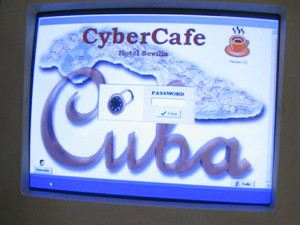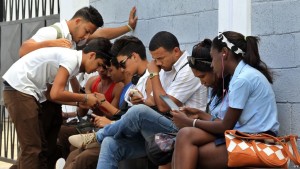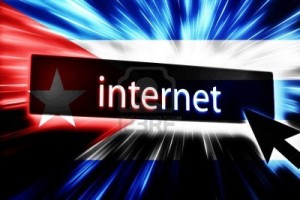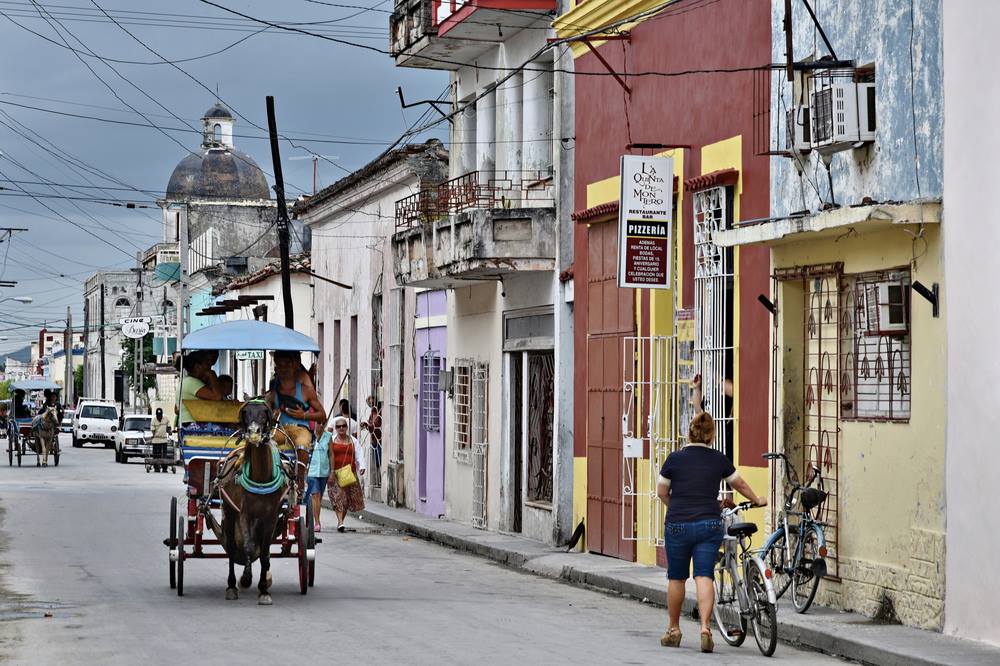CENTURY XXI:: CUBAN GOVERNMENT BEGINS TO INTRODUCE INTERNET TO THE ISLAND. .
Cuba is one of the countries with the lowest rate of connectivity in the world, with only 5%, which is reduced to 1% for broadband.
The state telecommunications monopoly (ETECSA) is unable to maintain a stable supply of recharge cards. That has led to a growth in illegal businesses that take advantage of high demand to sell cards at competitive prices.
Three months ago Cuba lives, although still limited, increased Internet access with 35 new WiFi hotspots, a boom that attaches to the Cubans and that has led to the proliferation of services “to the left” an unprecedented, in island slang .
Many “bisneros” or street traders took advantage of the inability of the state telecommunications monopoly (ETECSA) to maintain a stable supply of recharge coupons, high prices and lack of neophyte users, to provide services outside the legal and meet demand.
“It’s always been, try to solve as we can not really concerned how the problem is solved, connect,” says Gerardo, a young man who has settled with her laptop on a bench in the boulevard of San Rafael, in Old Havana, where it operates one of the areas of wireless Internet. Almost always the “solve” the Cuban has a direction: “left”, which explains this habanero means doing what we can to challenge the restrictions. Gerardo “the world moves through the Internet” so the network access brings “many benefits to Cubans,” although some still very difficult to pay 2 CUC (convertible peso to the dollar equivalent) which costs ON time. “The price of the card is very expensive, because we do not solve an hour, plus the connection is very slow, falls, you have to reconnect, and in the end it is not economical for us,” he said. The price of the card is very expensive, because an hour we do not solve Cuba is one of the countries with the lowest rate of connectivity in the world, with only 5%, which is reduced to 1% for broadband.
The eagerness of Cubans for web surfing has made 55,000 connections in each of the 35 access points scattered around the island are produced, and 8,000 of them simultaneously, according to official data. “Many people connect and Etecsa not keep selling recharge cards, queues are very long and only sell in working hours. You then have to go to the black market,” he explains, on condition of anonymity, a ‘bisnero “that provides these services.
Resell cards, usually 3 CUC (one above the official rate), means having “provided police over”, so this trader specifies dedicated to “install software” fix phones and WiFi networks enable mobile. Several local, including the main official newspaper, Granma, media criticize these “merchants” of access, ranging from mediators to users and those who use their devices to create alternative wireless networks accessed by half the official price. “People often do not have money and take advantage of what is offered, but we are aware of that and have increased surveillance to myself I took the police for no reason, and I had to let go,” says this young which recognizes that “WiFi is something that has not been prepared as it should be.”
Another user, Grisel, welcomes the opportunity to connect, but is concerned about the consequences, “you have to be aware that you do not carry mobile”, recognizing that the price is still “high” taking into account the average salary Cuban ($ 24 a month).
Hundreds of people, attentive to their phones, tablets and computers, are accommodated as they can on sidewalks, benches, stairs and curbs of streets within the WiFi zones, as Yainiel, who travels from Santiago de las Vegas, about 20 kilometers from Havana, to connect. “I come from far away,” he says, while affirming that “many people with phones and computers outdoors and robberies have increased insecurity”.
The young engineer acknowledges the poor quality of the connection, “when busy it gets really slow and money is costing you,” he added, adding that this is why many prefer to pay half, although illegal, he said. “If lower prices ETECSA (…) and expand the sale of cards, that (the illegalities) eventually fall,” he said, while claiming that in Cuba excuse “time is money itself.”
Agencies / EFE / Yeni Garcia / InternetPhotos / TheCubanHistory.com
The Cuban History, Hollywood.
Arnoldo Varona, Editor.
SIGLO XXI: GOBIERNO CUBANO COMIENZA A INTRODUCIR EL INTERNET.
Cuba es uno de los países con menor tasa de conectividad del mundo, con solo el 5%, porcentaje que se reduce al 1% en el caso de la banda ancha.
El monopolio estatal de las telecomunicaciones (Etecsa) es incapaz de mantener un suministro estable de tarjetas de recarga. Eso ha provocado un crecimiento de negocios ilegales que se aprovechan de la elevada demanda para vender tarjetas a precios competitivos.
Desde hace tres meses Cuba vive un inédito, aunque todavía limitado, incremento del acceso a Internet con 35 nuevos puntos de conexión WiFi, un auge que engancha a los cubanos y que ha propiciado la proliferación de servicios “por la izquierda”, en argot isleño.
Muchos “bisneros” o negociantes callejeros han aprovechado la incapacidad del monopolio estatal de las telecomunicaciones (Etecsa) para mantener un suministro estable de cupones de recargas, los elevados precios y el desconocimiento de los usuarios neófitos, para ofrecer servicios al margen de lo legal y atender la demanda.
“Es como siempre ha sido, tratamos de resolver como podemos, no nos preocupa realmente de qué forma, el problema es resolver, conectarse”, dice Gerardo, un joven que se ha acomodado con su portátil en un banco del bulevar de San Rafael, en La Habana Vieja, donde funciona una de las áreas de Internet inalámbrico. Casi siempre ese “resolver” del cubano tiene una dirección: “por la izquierda”, que según explica este habanero significa hacer lo que se pueda para desafiar las restricciones. Para Gerardo “el mundo se mueve a través de Internet”, por eso el acceso a la red trae “bastantes beneficios a los cubanos”, aunque para algunos todavía sea muy difícil pagar los 2 CUC (peso convertible equivalente al dólar) que cuesta la hora de conexión. “El precio de las tarjetas es muy caro, porque con una hora no resolvemos, además que la conexión es muy lenta, se cae, te tienes que volver a conectar, y al final eso no es económico para nosotros”, afirmó. El precio de las tarjetas es muy caro, porque con una hora no resolvemos Cuba es uno de los países con menor tasa de conectividad del mundo, con solo el 5%, porcentaje que se reduce al 1% en el caso de la banda ancha.
La avidez de los cubanos por navegar por la red ha hecho que se produzcan unas 55.000 conexiones en cada uno de los 35 puntos de WiFi repartidos por la isla, y de ellas 8.000 de forma simultánea, según datos oficiales. “Hay mucha gente conectándose y Etecsa no da abasto para vender tarjetas de recarga, las colas son muy largas y solo venden en horarios laborales. Ya después tienes que acudir a la bolsa negra”, explica, bajo la condición de anonimato, un “bisnero” que ofrece estos servicios.
Revender tarjetas, generalmente a 3 CUC (uno por encima de la tarifa oficial), significa tener “policías siempre encima”, por eso este negociante especifica que se dedica a “instalar softwares”, a arreglar teléfonos y habilitar redes WiFi en móviles. Varios medios locales, entre ellos el principal diario oficial, Granma, critican a estos “mercaderes” de WiFi, que van desde mediadores a usuarios y quienes usan sus dispositivos para crear redes inalámbricas alternativas a las que se accede por la mitad del precio oficial. “La gente muchas veces no tiene dinero y aprovecha lo que le ofrecen, pero ya están al tanto de todo eso y han aumentado la vigilancia; a mí mismo me llevó la policía, sin motivo, y me tuvieron que soltar”, dice este joven, que reconoce que “la WiFi es algo que no se ha preparado como debió ser”.
Otra usuaria, Grisel, celebra la oportunidad de conectarse, pero le preocupan las consecuencias: “tienes que estar pendiente, que no te lleven el móvil”, al reconocer que el precio continúa siendo “elevado” si se tiene en cuenta el salario promedio del cubano (unos 24 dólares al mes).
Cientos de personas, atentos a sus móviles, tabletas y ordenadores, se acomodan como pueden en aceras, bancos, escaleras y bordillos de calles dentro de las zonas WiFi, como Yainiel, quien viaja desde Santiago de las Vegas, a unos 20 kilómetros de La Habana, para conectarse. “Yo vengo de lejos”, cuenta, mientras afirma que “tantas personas con móviles y computadoras al aire libre han aumentado los robos y la inseguridad”.
El joven ingeniero reconoce la pobre calidad de la conexión: “cuando hay mucha gente se pone muy lenta y es dinero que te está costando”, matizó, al agregar que por eso muchos prefieran pagar la mitad, aunque sea ilegal, dijo. “Si Etecsa bajara los precios (…) y ampliara la venta de tarjetas, eso (las ilegalidades) al final se caería”, advirtió, mientras se excusa alegando que en Cuba “el tiempo sí es dinero”.
Agencies/EFE/Yeni Garcia/InternetPhotos/TheCubanHistory.com
The Cuban History, Hollywood.
Arnoldo Varona, Editor.



 2015: CUBAN GOVERNMENT Begins to Intruduce Internet to the Island. + 2015: Gobierno Cubano Comienza a Introducir el Internet en el País.
2015: CUBAN GOVERNMENT Begins to Intruduce Internet to the Island. + 2015: Gobierno Cubano Comienza a Introducir el Internet en el País.



